Explorers
The youngest children at Newfield School follow the Explorers Pathway. This pathway is for children in EYFS and key stage 1. The curriculum delivery is a play-based approach where the learning environment and adult support engages children, so they show curiosity and develop a love of learning. Pupils have opportunities to join in with structured circle times and during these times they will enjoy stories, songs, number rhymes and shared games and interactions with peers. They will have regular opportunities to play through provision so children can explore their interests and learn through play.
All of our learners at Newfield have complex additional needs. We understand the importance of ensuring the best for every child and these first few years are crucial for children, so they can form positive relationships, and engage in learning. At Newfield School we acknowledge and celebrate the differences in the needs and learning styles of our younger children. As such the pedagogical approach taken in explorers is an eclectic mix approach designed to optimise success for all our pupils. Teachers at the Explorers stage aim to develop skills through play-based approaches where children have resources and environments to explore and develop their knowledge and understanding of the world around them. Continuous provision gives children a range of experiences and play media with adults supporting and playing alongside. The outdoor environment is also capitalised upon to provide learning opportunities.
At the Explorers stage we promote our learners to become active participants in their learning. We create enabling environments that are designed to promote children’s curiosity about the world around them and to enjoy interacting with the people they meet and develop relationships with.
Although Explorers continue to the end of key stage one, learners are assessed by systems appropriate to their age - see assessment.
Staff prioritise nurturing warm and respectful relationships in all aspects of the early years and ensure children feel safe and secure to learn and flourish.
Overview
At Newfield School we acknowledge and celebrate the differences in the needs and learning styles of our younger children.
As such the pedagogical approach taken during the formative years is an eclectic mix approach designed to optimise success for all our children. Teachers at the Explorers stage aim to develop skills through play-based approaches where children have resources and environments to explore and develop their knowledge and understanding of the world around them.
Play provisions give children a range of experiences and play media with adults supporting and playing alongside. The outdoor environment is also capitalised upon to provide learning opportunities.
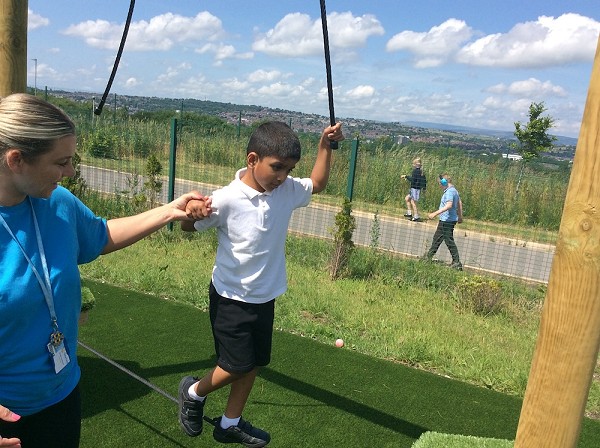
At the Explorers stage we promote our learners to become active participants in their learning. We create enabling environments that are designed to promote children’s curiosity about the world around them and to enjoy interacting with the people they meet and develop relationships with.
Although Explorers continue to the end of KS1, learners are assessed by a system appropriate to their age, including Reception Baseline Assessment, Early Years Foundation Stage Profile (EYFSP) and Year 1 phonics check.
Explorer’s Overview - provision in more detail
Click here to view or download3 Characteristics of Effective Teaching
In delivering our Explorers curriculum, the 3 characteristics of effective learning - playing and exploring, active learning, creating and thinking critically - permeate and underpin the approach. Additionally, the 7 key features of effective practice are part of our ethos and are used as guiding principles to the Explorer provision.
Please click these links to see key documentation which informs our practice for our EYFS children, but is also embedded as part of the whole Explorers provision. Children with complex additional needs develop skills at differing rates and at Newfield we provide an inclusive environment, considering their individual needs and supporting them to have the best possible start to their school life. Development Matters (September 2023) informs our understanding of early childhood development, which has been taken into consideration when designing the Explorer’s Curriculum.
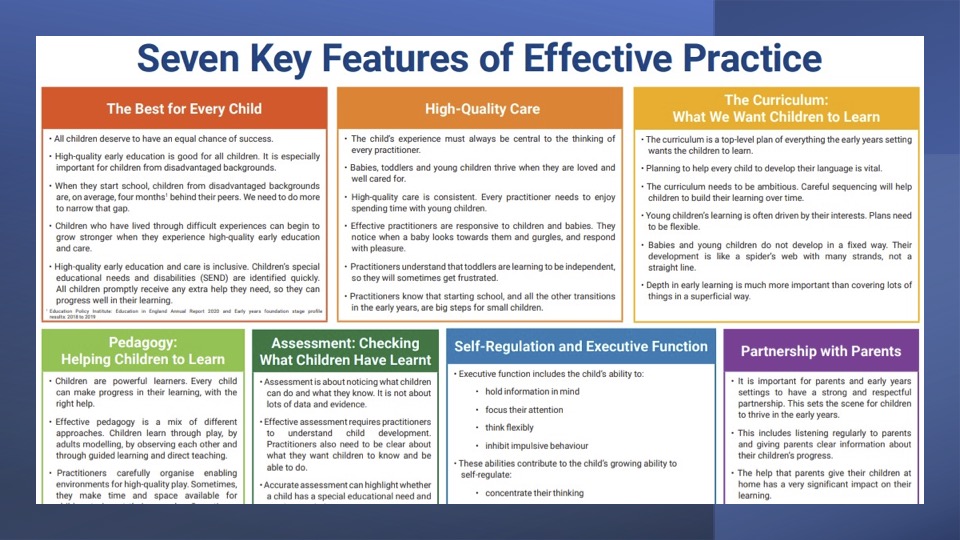
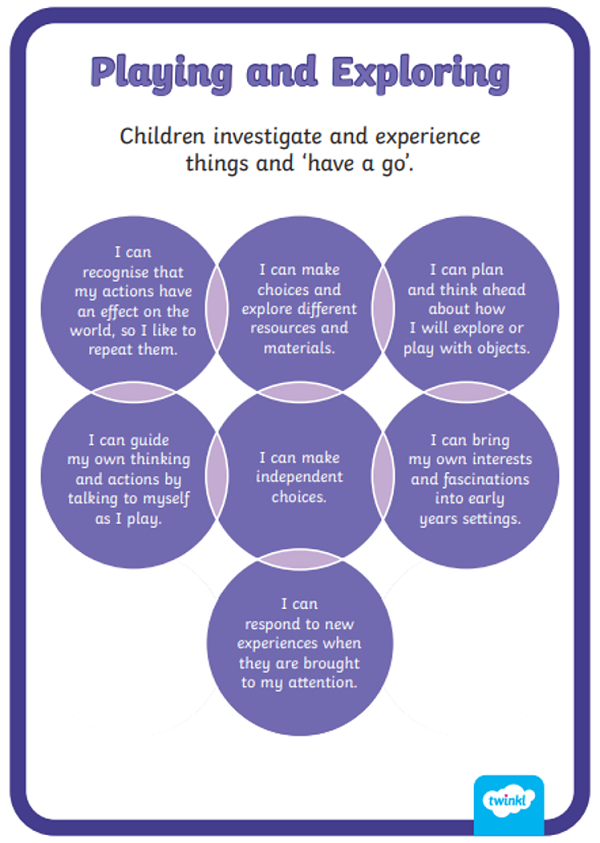
Playing and Exploring
What this looks like in Newfield Explorers
playing and exploring – children are encouraged to explore their environment with as much independence as possible. Some children require additional support to be able to handle objects or explore them safely so staff aim to do this while enabling children to ‘have a go’ and explore as freely as possible.
- Continuous Provision provides opportunities for pupils to explore a range of high-quality resources
- Development of outdoor provisions
- Adults support in provision for children to make choices, have a go at new and favoured activities. Adults model vocabulary and play skills whilst giving pupils opportunities to be independent in their play
- Using pupil’s interests to guide provision
- Curiosity Approach
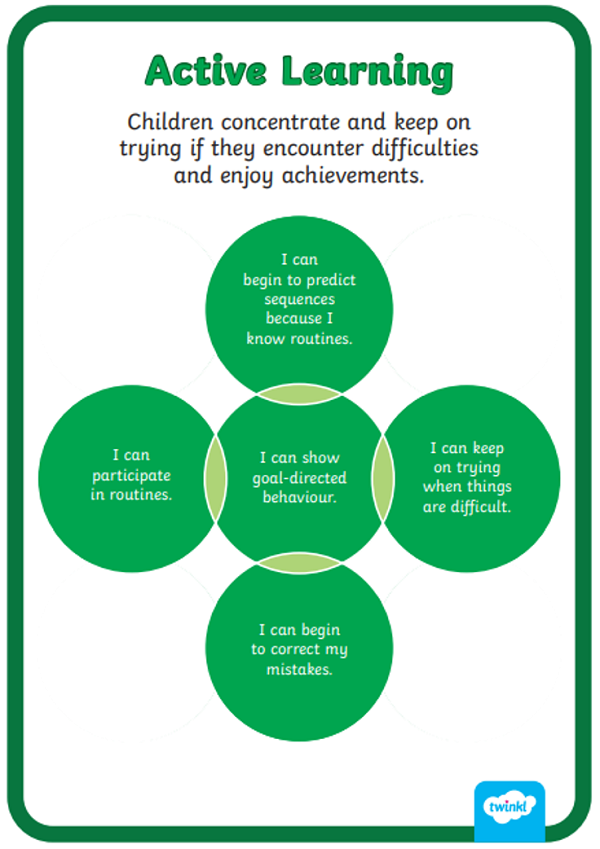
Active Learning
What this looks like in Newfield Explorers
active learning – staff create opportunities for active learning to take place by planning activities and providing resources that are accessible for the children. They may be involved in a range of therapy programmes which are integrated into their learning experience to create opportunities for them to be actively involved in their learning activities.
- Clear routines and structures – predictable for pupils supported through total communication approaches
- Positive, Nurturing relationships with familiar staff so pupils feel supported and able to make mistakes
- Making learning fun
- Opportunities to explore freely
- Pace of learning to be individualized, opportunities for repetition so pupils become confident and have secure deeper knowledge and understanding
- Staff modelling and support where needed but opportunities to have a go first
- Supporting emotional regulation – individualized plans, sensory diets
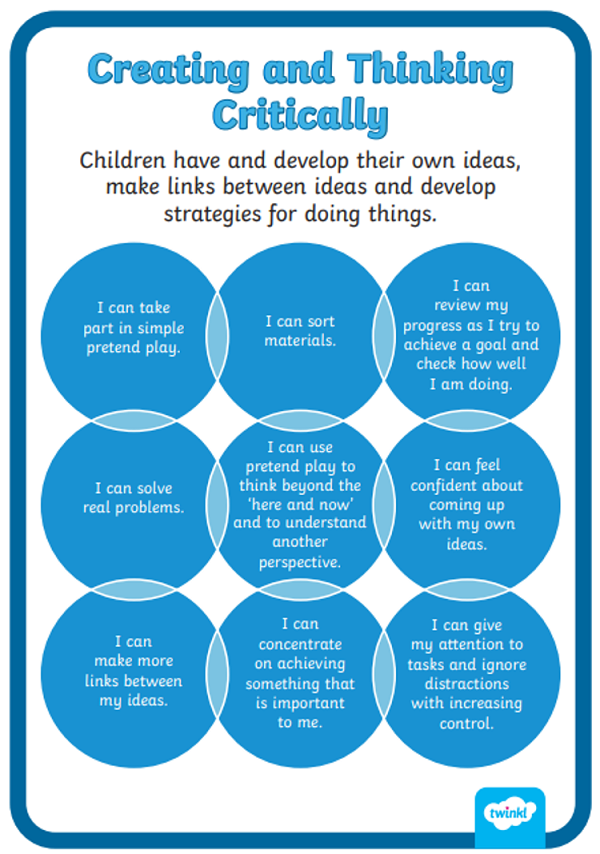
Creating and Thinking Critically
What this looks like in Newfield Explorers
creating and thinking critically – a thematic approach helps children make links and begin to develop the skills of thinking critically and creatively. Staff provide experiences that optimise the children being able to think through problems and find solutions for themselves. Some children may have significant cognitive difficulties so all experiences will be accessible to them at an appropriate level.
- Open ended resources
- Regular uninterrupted play opportunities
- Working towards Goals – individualized EHCPs and celebrating successes through photographs, sharing work, parental involvement
- Role play/ Pretend Play skills key daily focus through continuous provision
- Breath of play experiences
- Imaginative play – staff modelling, exemplars
Seven Areas of Learning
The Explorer Curriculum is divided into 7 Areas of Learning. Three Prime areas, which are Communication and Language, Personal Social and Emotional Development and Physical Development. These are core to our teaching and there will be opportunities to work on these fundamental skills throughout the day during circle times, continuous provision and the daily routines. The specific areas are; Literacy, Understanding The World, Mathematics and Expressive Arts. Children will explore these areas through topic based learning to give them a wide breadth of experinces and have opportunities to explore those ideas and concepts within their play based learning.
Our curriculum covers seven areas of learning.
The prime areas are; ‘Communication and Language’, ‘Physical Development’ and ‘Personal, Social and Emotional Development’.
The specific areas are; ‘Literacy’, ‘Mathematics’, ‘Understanding The World’ and ‘Expressive Arts and Design’.
Within the Explorers curriculum the key stage one subjects are embedded into these seven areas.
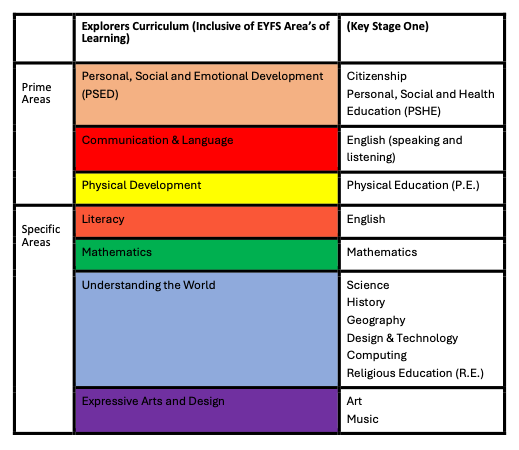
Explorer’s Curriculum Map
Click here to view or downloadPrime Areas - Communication and Language
The development of children’s spoken language underpins all seven areas of learning and development. Children’s back-and-forth interactions from an early age form the foundations for language and cognitive development. The number and quality of the conversations they have with adults and peers throughout the day in a language-rich environment is crucial.
By commenting on what children are interested in or doing, and echoing back what they say with new vocabulary added, practitioners will build children’s language effectively. Reading frequently to children, and engaging them actively in stories, non-fiction, rhymes and poems, and then providing them with extensive opportunities to use and embed new words in a range of contexts, will give children the opportunity to thrive.
Through conversation, storytelling and role play, where children share their ideas with support and modelling from their teacher, and sensitive questioning that invites them to elaborate, children become comfortable using a rich range of vocabulary and language structures.
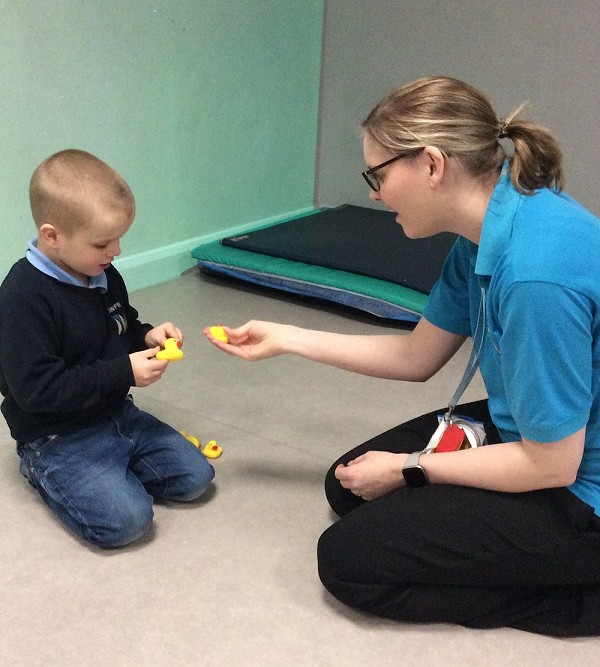
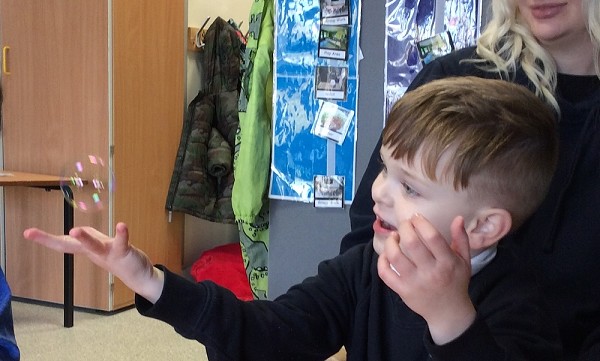
Communication and Language is embedded throughout the daily routines, planned learning opportunities and through specific interventions. There will be regular opportunities for high quality interactions and hearing vocabulary through experiential learning. Established and research-based approaches are drawn upon to support this learning including; intensive interaction, daily group sessions and circle time, PSHE times, Wellcomm, stories during ‘Drop everything and Read’, singing, speech and language support, library visits and assemblies.
In each Topic pupils have opportunities to work on expressive and receptive communication. Pupils will have their own communication systems and a total communication approach is embedded into the curriculum and daily life of the school. Alternative, Augmentative Communication is used throughout school, and in explorers we aim to start pupils on their journey to accessing the right adaptative communications for them including approaches such as P.E.C.S., Makaton and signing, Voice output devices, iPad and eye gaze technology.
Prime Areas - Personal, Social and Emotional Development
Children’s personal, social and emotional development (PSED) is crucial for children to lead healthy and happy lives and is fundamental to their cognitive development. Underpinning their personal development are the important attachments that shape their social world. Strong, warm and supportive relationships with adults enable children to learn how to understand their own feelings and those of others. Children should be supported to manage emotions, develop a positive sense of self, set themselves simple goals, have confidence in their own abilities, to persist and wait for what they want and direct attention as necessary. Through adult modelling and guidance, they will learn how to look after their bodies, including healthy eating, and manage personal needs independently. The independence aspect is particularly important at Newfield School and staff maintain a focus on creating opportunities to develop independence throughout the day. Through supported interaction with other children, they learn how to make good friendships, co-operate and resolve conflicts peaceably. These attributes will provide a secure platform from which children can achieve at school and in later life.
The curriculum coverage ensures pupils have opportunities to learn about different relationships including their families and people who care for me, their friendships and respectful relationships. There are experiences to support pupils to learn how to keep themselves safe and as well as their physical health and understanding of their bodies, they will also learn about physical and mental health including healthy eating and personal care.
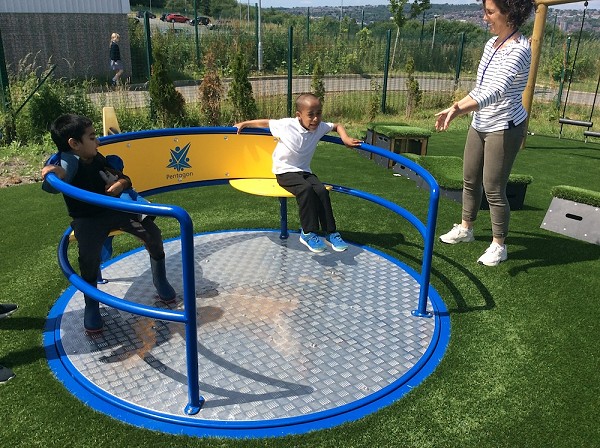
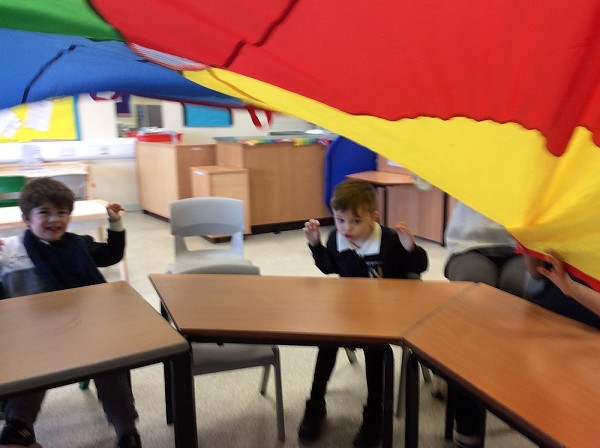
Prime Areas - Physical Development
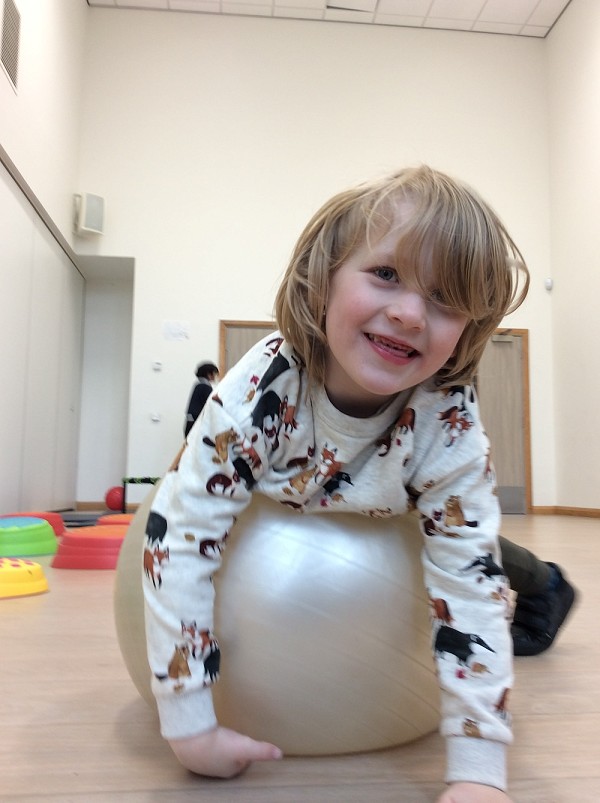
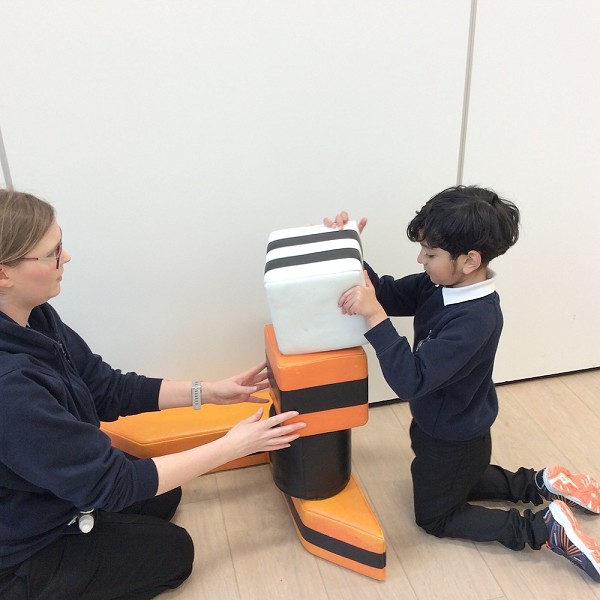
Physical activity is vital in children’s all-round development, enabling them to pursue happy, healthy and active lives. Gross and fine motor experiences develop incrementally throughout early childhood, starting with sensory explorations and the development of a child’s strength, co-ordination and positional awareness through tummy time, crawling and play movement with both objects and adults.
Children at Newfield often have difficulties and delays in their physical development due to the specific nature of their special educational needs and disabilities and approaches such as MOVE help support physical development, as does regular input and liaison with specialist Occupational and Physio Therapists. By creating games and providing opportunities for play both indoors and outdoors, adults can support children to develop their core strength, stability, balance, spatial awareness, co-ordination and agility. Gross motor skills provide the foundation for developing healthy bodies and social and emotional well-being for positive body image and confidence. Fine motor control and precision helps with hand-eye co-ordination, which is later linked to early literacy. Repeated and varied opportunities to explore and play with small world activities, puzzles, arts and crafts and the practice of using small tools, with feedback and support from adults, allow children to develop proficiency, control and confidence. Specific pedagogy is used to support pre-writing skills, based on the needs for children to have good gross and fine motor skills to be able to develop writing. The ‘Squiggle whilst You Wiggle’ approach is used in classes to develop a range of motions to support physical development to prepare for and develop writing.
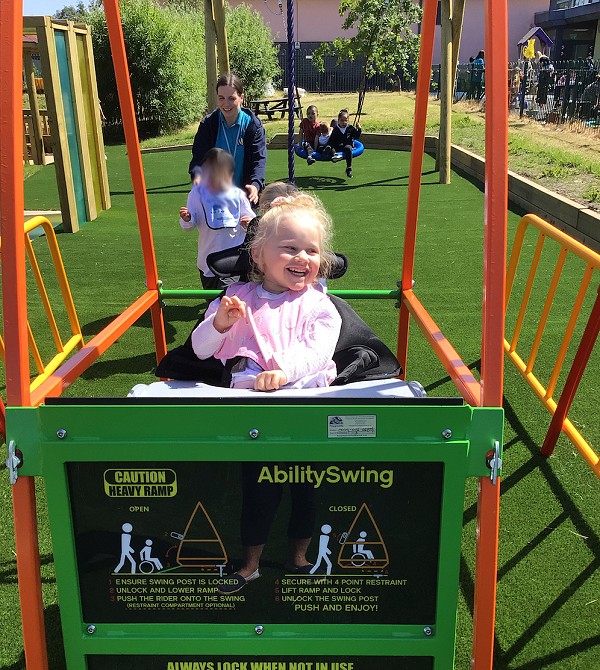
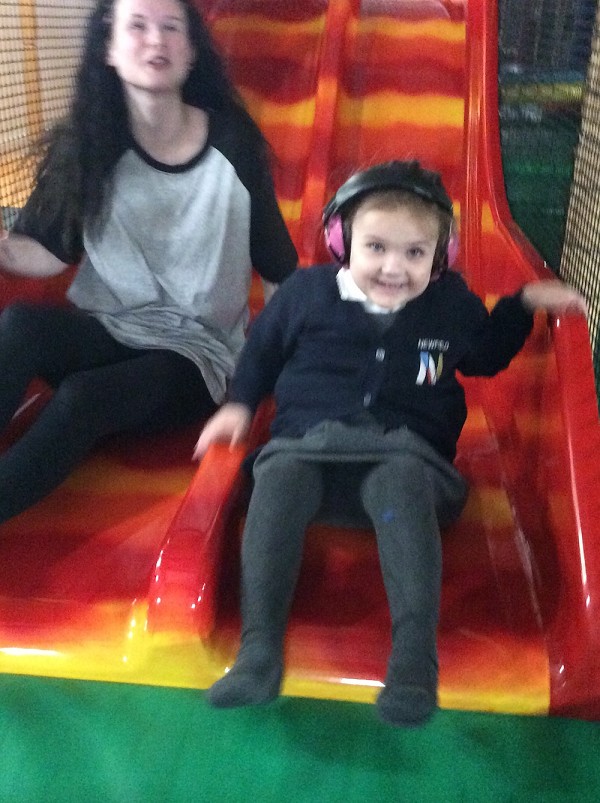
The Explorer’s curriculum covers the ‘fundamental ten key skills’ which are; catching, running, hopping, skipping, jumping, overarm throwing, underarm throwing, rolling a ball, bouncing a ball and kicking a ball.
Physical Literacy is an inbuilt desire to be active and have an enjoyment of an active lifestyle. It can be defined as ‘the motivation, confidence, physical competence, knowledge and understanding to maintain physical activity throughout the life course.
Explorers will follow a healthy movers programme to support planning and ensure a breadth of experiences through these focus areas; agility, locomotion, co-ordination, object control, balance/stability, healthy eating, oral health and body image and body confidence.
Twinkl Move programmes are also used to support the delivery of the physical development curriculum within the Explorer’s provision.
Specific Areas - Literacy
It is crucial for children to develop a life-long love of reading. Reading consists of two dimensions: language comprehension and word reading. Language comprehension (necessary for both reading and writing) starts from birth. It only develops when adults talk with children about the world around them and the books (stories and non-fiction) they read with them, and enjoy rhymes, poems and songs together.
Skilled word reading, taught later, involves both the speedy working out of the pronunciation of unfamiliar printed words (decoding) and the speedy recognition of familiar printed words. Writing involves transcription (spelling and handwriting) and composition (articulating ideas and structuring them in speech, before writing)
Writing
Children will develop writing and pre-writing skills at varying rates. The expectation of writing is based on individuals.
Fine motor activities are provided to support the development of pre-writing skills. A range of approaches are used to support early writing development, including ‘Squiggle whilst you Wiggle’ and the use of symbols to introduce symbolic understanding for writing.
Children have opportunities to explore lots of different purposes linked into their topics.
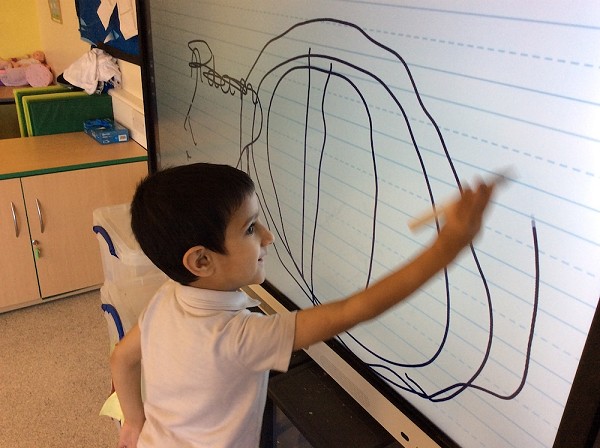
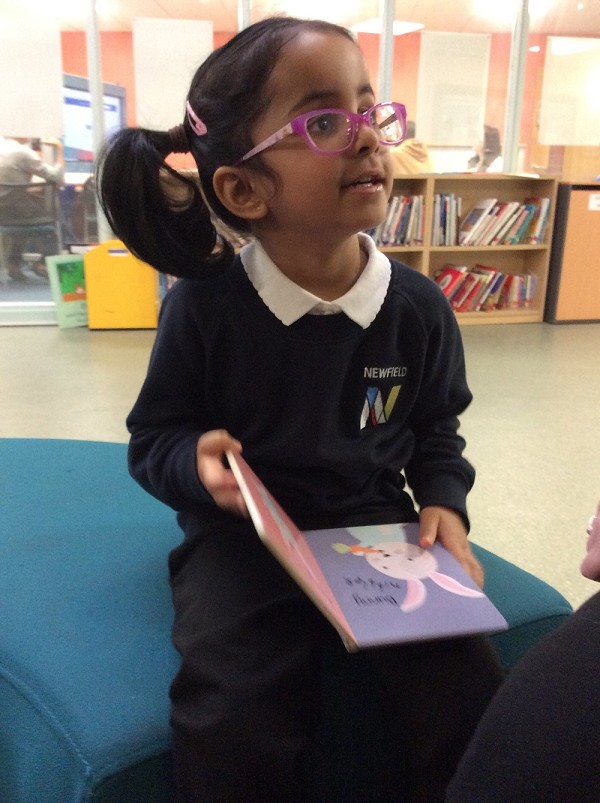
Reading and Phonics
Children will develop their phonological awareness at varying rates. Twinkl Phonics is delivered throughout school, starting in explorers. Daily phonics input will be delivered and if pupils are working within level one there will be opportunities to make connections through the topic-based learning.
Pupils working within level one will work on key skills linking to the 7 aspects covered in level one (Environmental Sounds, Instrumental sounds, Body Percussion, Rhythm and Rhyme, Alliteration, Voice sounds and Oral Blending and Segmenting). Pupils will progress into level 2 and beyond based on ongoing teacher assessments.
Pupils will have access to books in classes as part of continuous provision and access to the school library. A range of texts will be available throughout the year, including books with multi-sensory elements and reading books linked to individual reading levels where appropriate.
Each day pupils will ‘Drop Everything and Read’ where stories will be shared, either individually or as a group, to develop a love of reading and give pupils opportunities to hear a varied range of language.
Books are shared as part of topics and used to develop a range of literacy skills, including reading and writing. Interesting and age-appropriate books have been planned out across the curriculum coverage cycles and include a range of authors and Context. Some of our most popular Authors used within the Explorer curriculum are; Eric Carle, Julia Donalson, Nick Sharratt, Janet & Allan Ahlberg, Jill Murphy, David McKee, Rod Campbell and Micheal Rosen.
There are lots of other authors and illustrators to explore too covering a range of texts set in different environments and with a range of characters to capture children’s imaginations. Alongside these texts we also have a strong focus on Traditional and Fairy Tales. We also use a range of non-fictions texts to develop our knowledge on a range of topics.
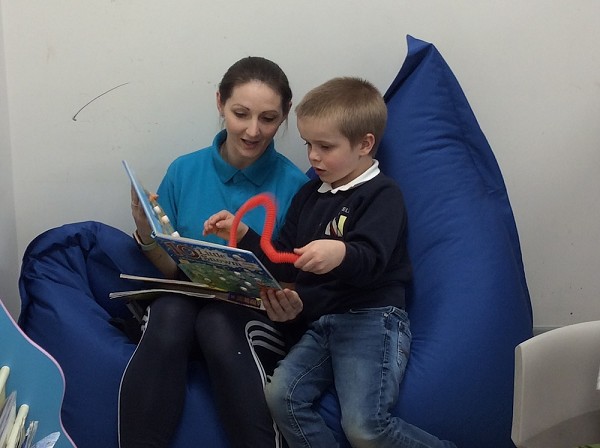
Specific Areas - Mathematics
Mathematics is covered through a range of experiences; including using songs and rhymes, role play, construction play, shape toys such as shape sorters, jigsaws and puzzles and linked to topics throughout each year to ensure a broad range of experiences. Mathematics is embedded into all areas of the curriculum and practitioners ensure to use mathematical language during daily routines and activities. Continuous provision provides opportunities for pupils to explore applications of mathematics through a wide range of play opportunities. Teachers consider how to use pupils’ interests to engage them in their play and model skills to pupils during these times.
Developing a strong grounding in number is essential so that all children develop the necessary building blocks to excel mathematically. Children should be able to count confidently, develop a deep understanding of the numbers, the relationships between them and the patterns within those numbers. By providing frequent and varied opportunities to build and apply this understanding, children will develop a secure base of knowledge and vocabulary from which mastery of mathematics is built. In addition, it is important that the curriculum includes rich opportunities for children to develop their spatial reasoning skills across all areas of mathematics including shape, space and measures. It is important that children develop positive attitudes and interests in mathematics, look for patterns and relationships, spot connections, ‘have a go’, talk to adults and peers about what they notice and not be afraid to make mistakes.
The key areas of mathematics in the Explorer Curriculum, and the broad skills and knowledge pupils will be working towards are outlined below. The long-term curriculum maps show how this is focused on across each year and the time commitments to this. However, although there will be opportunities for direct teaching, these skills will be practiced and revisited regularly through continuous provision and adult interactions.
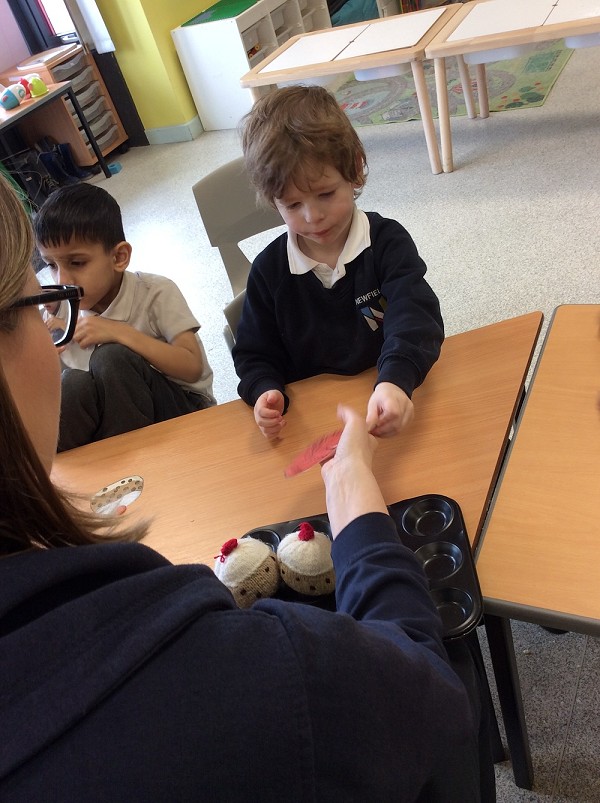
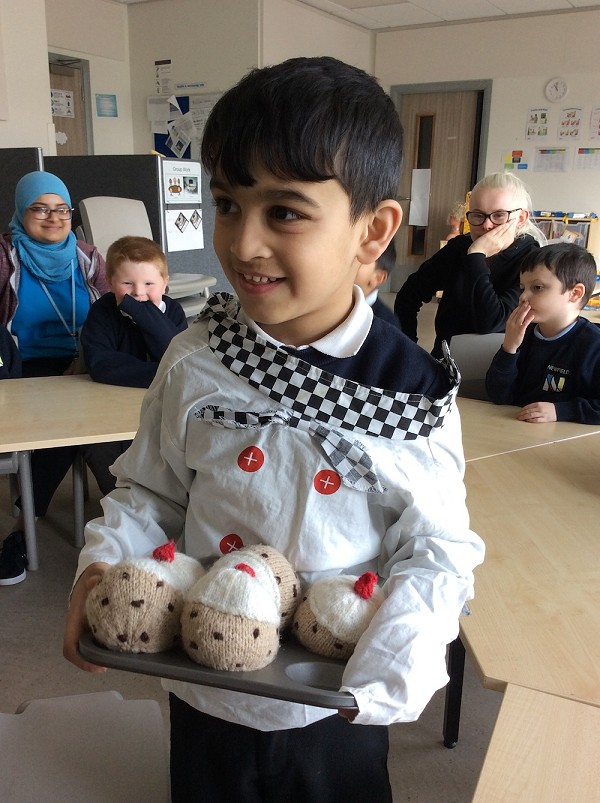
Key Areas
Number and Number Patterns
This includes children developing skills to count, understand place value and cardinality. They will also work on developing skills to subitise and apply their counting in daily routines and through play. They explore how patterns in number and in the world around us inform our understanding and sequencing and predictions.
Composition of Number
Children learn and have a deep understanding of number and how quantities are made up, for example through making their own quantities and group of objects and exploring number bonds. They explore concepts of addition, subtraction, multiplication, division and fractions in practical activities and play so they can notice changes to the composition of numbers.
Geometry: Shape and Space
-
Spatial awareness helps children to develop a sense of position and direction, understanding movements and navigating spaces. This can be taught through a range of play experiences such as during role play, small world and construction play and as part of outdoor provision. Children will learn to position objects and use spatial language when creating models or manipulating shapes and objects.
- Shapes are present in the world around us, and in Explorers children learn to explore shapes by combining them to make pictures and exploring their uses through play such as making shapes in malleable materials or noticing shapes they see during their play. They use 3D shapes in construction and junk modelling tasks. Children begin to describe and name some informal shapes and develop to their knowledge to use, identify and know the names for 2D and 3D shapes. They can also create patterns using shapes and notice patterns in the world around them.
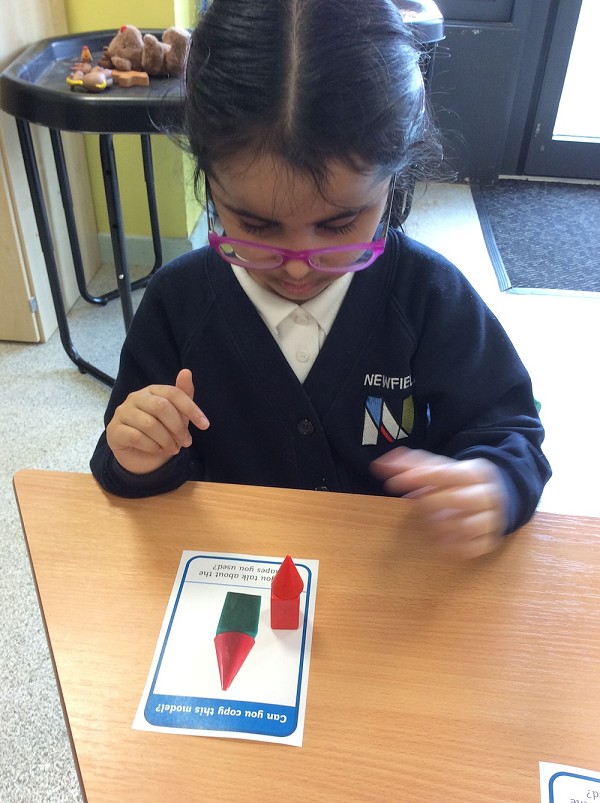
Measurement
- Children explore the size and capacity of a range of objects in play, comparing lengths, heights, weights and capacities. They can do this through their play, in sand and water and construction areas for example. They also will use cooking sessions to explore measuring ingredients with adult support.
- Money is used in role play regularly throughout the Explorer’s provision and some opportunities to use money skills are part of our curriculum. Children work on the value of money by exchanging money for items in play and begin to notice difference between coins and their values, applying their knowledge of number to money.
- Time is developed through children’s understanding the daily routines and changes in days of the week and months. In Explorers, each day of the week has a coloured activity and children join in with this at the start of each day to cue them into what day it is. They also anticipate passing of times through songs and routines as part of the day-to-day class routine. Children also develop their understanding of time by sequencing events or activities as part of play and using mathematical language such as fast, slow, earlier, later which is modelled by staff throughout the day.
Specific Areas - Understanding the World
Understanding the world involves guiding children to make sense of their physical world and their community. There is a focus on People, Cultures and Communities throughout each year. The frequency and range of children’s personal experiences increases their knowledge and sense of the world around them – from visiting parks, libraries and museums to meeting important members of society such as police officers, nurses and firefighters. In addition, listening to a broad selection of stories, non-fiction, rhymes and poems will foster their understanding of our culturally, socially, technologically and ecologically diverse world. As well as building important knowledge, this extends their familiarity with words that support understanding across domains. Enriching and widening children’s vocabulary will support later language development and reading comprehension.
The ‘Understanding the World’ curriculum area covers a wide range of subjects including History (Past and Present), Science, Geography (The Natural World), Design and Technology, Computing and R.E. Children who are in the Explorers provision will develop knowledge of those curriculum areas within each topic. Pupils will have opportunities to work scientifically through their exploration of play-based activities linked to the three principles of effective practice outlined above.
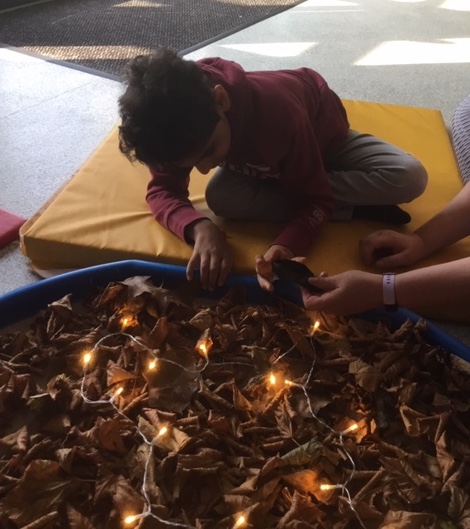
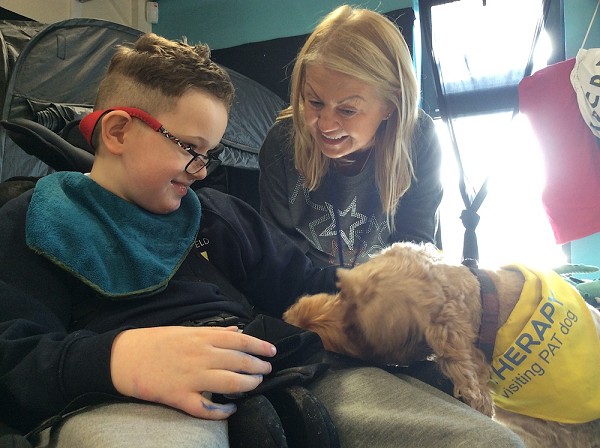
R.E. is covered through experiential learning, through the key ideas of discovering, exploring, connecting and responding. The use of religious stories and key religious events throughout the year give children opportunities to develop their connections with other people and their beliefs, to develop knowledge of different religions to include awareness of special events, artifacts, places and people. Sensory elements and symbols will be available for pupils to discover through role play and learning activities, extra curriculum events and adult interactions. The Events Calender will ensure a range of experiences and be relevant to the time the religious events occur, which may change each year for events such as Eid. Pupils’ values are respected, and we encourage pupils to share their own family life experiences in school.
Specific Areas - Expressive Arts
The development of children’s artistic and cultural awareness supports their imagination and creativity. It is important that children have regular opportunities to engage with the arts, enabling them to explore and play with a wide range of media and materials. The quality and variety of what children see, hear and participate in is crucial for developing their understanding, self-expression, vocabulary and ability to communicate through the arts. The frequency, repetition and depth of their experiences are fundamental to their progress in interpreting and appreciating what they hear, respond to and observe and gives children an insight into new musical worlds.
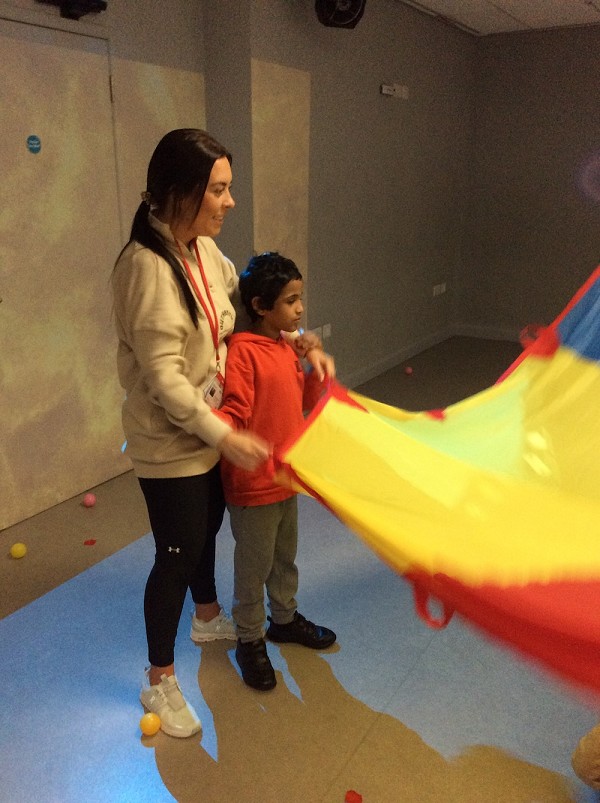
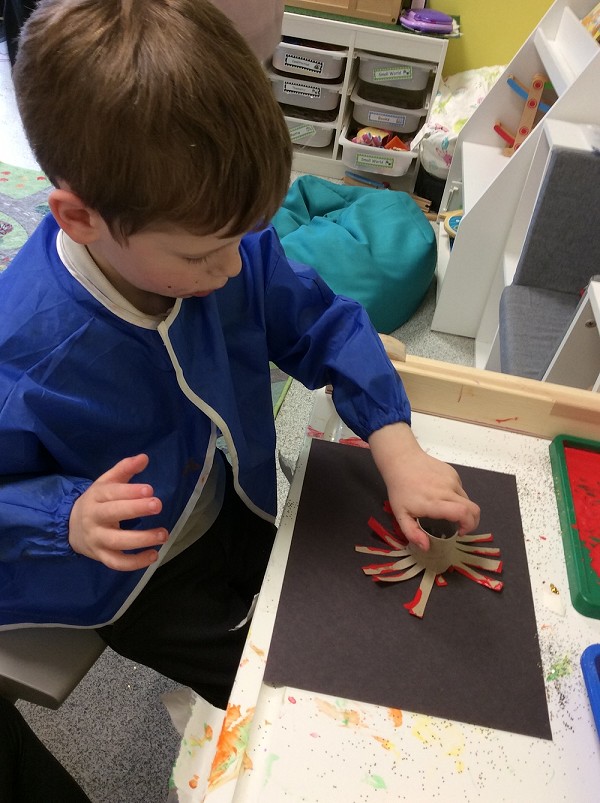
Children have opportunities to see and hear a range of art and music, to inspire them and to enhance their vocabulary to describe the art. The topics provide a range of experiences including music and art from other cultures and more familiar songs and rhymes. Children also have opportunities to create their own music and art linked to each topic.
Role Play activities through continuous provision are fundamental in ensuring children have opportunities to express themselves and their ideas through their play and provide a range of experiences linked to each topic.
The use of ‘Wow’ events gives children opportunities to perform to an audience and experience visiting musicians in to play music to children, and talking about it enhances this love of music and expressive arts. Also, providing opportunities for children to listen attentively to music and discuss what they hear.
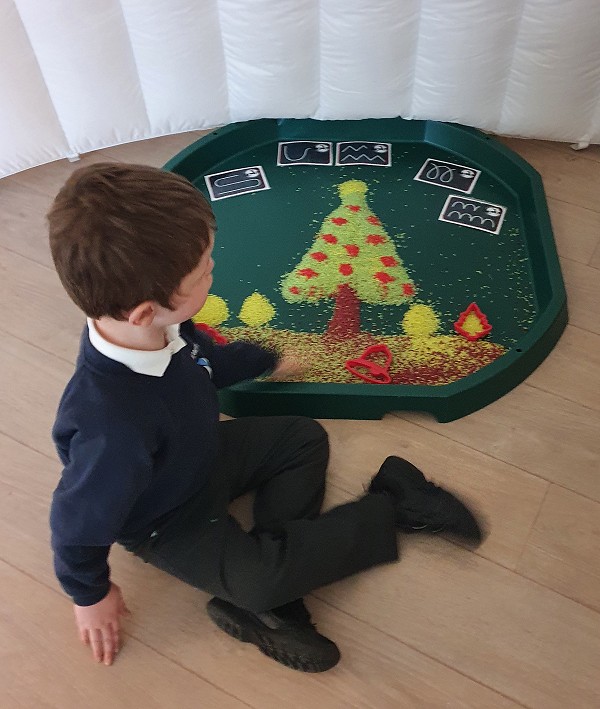
Assessment
Learners progress is monitored closely through their time in the Explorers phase.
Their EHCP outcomes are tracked and evaluated termly with evidence collected and shared with parents and carers via the Evidence for Learning (EfL)app.
EfL is also used to track and record the learners progress against the Explorers Framework which captures all aspects of their development and provides information to parents and teachers when they transition into their pre- formal or semi-formal pathway at Key Stage 2.
BSquared assessments are also completed summative for our Explorers learners.
EYFS pupil have specific statutory assessments and more information about these can be found on our EYFS assessment page
Year 1 and 2 learners are assessed against the Engagement Steps or Progression steps, with Pre- Key Stage Standards being recorded, where appropriate, for learners at the end of Year 2 using Bsquared.
Children in Year One may also complete the Statutory Year One Phonics Check where appropriate.
For further information please see our section on whole school Assessment.